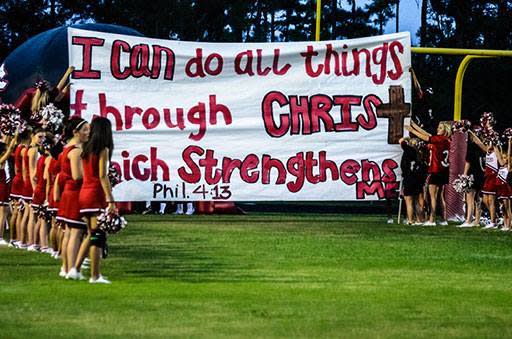Cheerleaders Break Stereotypes by Fighting for Their First Amendment Rights

Kountze High School cheerleaders hold up a sign with a Bible quotation. (Photo: Facebook)
Undeniably, teenagers are strong in their convictions — no scientific studies needed to back that up. But a group of young cheerleaders took this sense of faith — quite literally — to another level when they waged a war against the Constitution.
Starting in 2012, members of the Kountze High School cheer squad decided to amp up their football team and its supporters with acceptance instead of aggression. More specifically, their yells and shouts employed Bible verses, not negative slogans like “Fight,” “Kill,” “Squash.” But invoking Christianity in a school setting sparked a high-profile legal battle, one that has continued in spite of the fact that the team of plaintiffs is no longer cheering for the Lions, their school’s team.
Yet this hasn’t stopped them from pursuing what they believe to be right, even if the case at this point is simply about parsing legal jargon. The reason? The women believe God is working through them, according to Emma Green’s recent article in The Atlantic. “Me and my peers — we were just people that God chose to use. And for some reason, some ministries get more attention than others,” Rebecca Richardson said.
Growing up in Kountze, a small town with a population of 2,100, mostly white and Christian, Richardson was rarely exposed to individuals of different backgrounds. “I’ve learned a lot about diversity, especially religious diversity. My favorite people are the people who are unapologetic about the things that they say and do.”
Richardson and her fellow cheerleaders, the ones who have stuck with the legal proceedings despite personal relevance, seem to embody this. Regardless of how one feels about the fight, the women are shattering a long-held stereotype: Cheerleaders are not just enthusiastic pompom paraders — they’ve got brains and beliefs too.
Cheerleaders, perhaps because of the fact that their role literally places them on the sidelines, have generally never been perceived favorably by the masses. For decades, the sport — it only became one officially in 2014 in order to increase safety protocols and funding — has been portrayed in the media with blonde bimbos more focused on bagging the quarterback than succeeding at schoolwork.
Except it’s clear that this unfavorable picture, the one that depicts these young women as secondary members of society pushing feminism back a century or two, is inaccurate. Sure, all perceived notions stem from somewhere, yet it’s unfair to assume that all high school cheerleaders rely on their looks to get by — remember, they are kids after all. Professional cheerleaders, while largely overshadowed by the hulking athletes displaying their manly bravado on the field, spend their off-hours working jobs to pay the bills (their schedules during the season are just as strict as the guys they cheer on) and doing charity work.
Cheerleaders aren’t the only females to be marginalized in this manner. Look at sorority girls. First of all, these are women over the age of 18, and they’re still saddled with an adolescent demarcation instead of one emphasizing their maturity. Tory Burch, Hoda Kotb, Condoleezza Rice, Katie Couric, Sara Blakely, and other prominent women were all members of a sorority during their college days.
A slew of other careers, jobs, and activities similarly silo women into prejudicial roles, including secretaries, housewives, hairdressers, and more. One small step for cheerleaders — another smaller step for female kind.
Follow us on Instagram, Facebook, and Pinterest for nonstop inspiration delivered fresh to your feed, every day.
